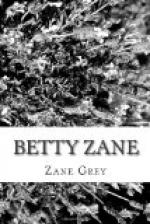Jonathan Zane and Major McColloch watched the river. Wetzel had disappeared as if the earth had swallowed him. Some pioneers said he would never return. But Col. Zane believed Wetzel would walk into the Fort, as he had done many times in the last ten years, with full information concerning the doings of the Indians. However, the days passed and nothing happened. Their work completed, the settlers waited for the first sign of an enemy. But as none came, gradually their fears were dispelled and they began to think the alarm had been a false one.
All this time Alfred Clarke was recovering his health and strength. The day came when he was able to leave his bed and sit by the window. How glad it made him feel to look out on the green woods and the broad, winding river; how sweet to his ears were the songs of the birds; how soothing was the drowsy hum of the bees in the fragrant honeysuckle by his window. His hold on life had been slight and life was good. He smiled in pitying derision as he remembered his recklessness. He had not been in love with life. In his gloomy moods he had often thought life was hardly worth the living. What sickly sentiment! He had been on the brink of the grave, but he had been snatched back from the dark river of Death. It needed but this to show him the joy of breathing, the glory of loving, the sweetness of living. He resolved that for him there would be no more drifting, no more purposelessness. If what Wetzel had told him was true, if he really had not loved in vain, then his cup of happiness was overflowing. Like a far-off and almost forgotten strain of music some memory struggled to take definite shape in his mind; but it was so hazy, so vague, so impalpable, that he could remember nothing clearly.
Isaac Zane and his Indian bride called on Alfred that afternoon.
“Alfred, I can’t tell you how glad I am to see you up again,” said Isaac, earnestly, as he wrung Alfred’s hand. “Say, but it was a tight squeeze! It has been a bad time for you.”
Nothing could have been more pleasing than Myeerah’s shy yet eloquent greeting. She gave Alfred her little hand and said in her figurative style of speaking, “Myeerah is happy for you and for others. You are strong like the West Wind that never dies.”
“Myeerah and I are going this afternoon, and we came over to say good-bye to you. We intend riding down the river fifteen miles and then crossing, to avoid running into any band of Indians.”
“And how does Myeerah like the settlement by this time?”
“Oh, she is getting on famously. Betty and she have fallen in love with each other. It is amusing to hear Betty try to talk in the Wyandot tongue, and to see Myeerah’s consternation when Betty gives her a lesson in deportment.”
“I rather fancy it would be interesting, too. Are you not going back to the Wyandots at a dangerous time?”
“As to that I can’t say. I believe, though, it is better that I get back to Tarhe’s camp before we have any trouble with the Indians. I am anxious to get there before Girty or some of his agents.”




